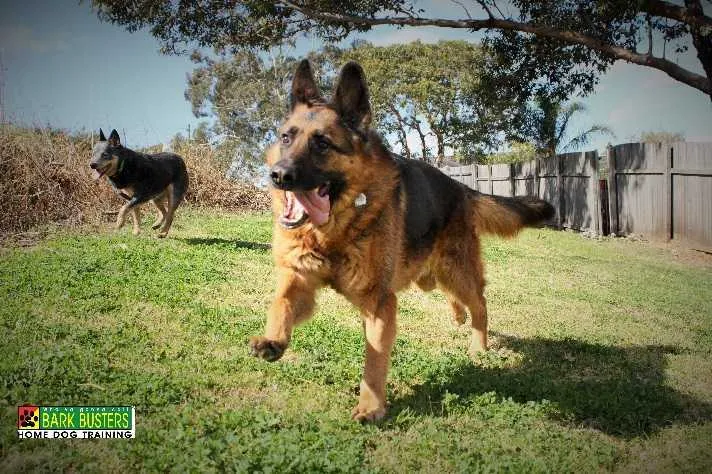Mental Vs. Physical Stimulation For Your Dog

Does this description sound familiar to you: "My dog, Ranger, just won't settle down. He seems to have an endless supply of energy, even after running around all day." This is a common description shared by many Bark Busters clients during our initial conversation.
If this sounds familiar to you, the first question to ask yourself is "How am I stimulating my dog's mind?" If your answer is "I do not know," following are some suggestions to help you differentiate between physical and mental exercise, which in turn will help tire your bundle of joy.
This is an area where there is a parallel between dogs and people. If you have a mentally stimulating day where your brain really gets a workout, you are usually very tired and ready to just relax. If you don't have any mental stimulation, you have more energy at the end of the day. The same holds true with your dog.
Have you noticed that a physical workout energises you? The physical conditioning builds more stamina. It's the same with dogs. There is a point where the exercise will tire them, but it takes a lot! Dogs can run and run for hours and still be ready for more, but 10 to 15 minutes of making them concentrate and THINK is exhausting, and they'll be ready for a nap. Just as the physical exercise will give you and your dog physical stamina, exercising the brain will build mental stamina.
So, how can you exercise your dog's brain? Obedience training is one great way. Making your dog sit and stay, correcting their mistakes and praising them for the right behaviour is a great way of stimulating their brain. They need to think about what they're doing and they need to concentrate. They don't want a correction. They want to be praised, so they have to think about what they're doing.
A very slow walk, making sure they are right next to you, is another brain-stimulating exercise. The slower you walk, the more your dog has to think about what they're doing. We've seen, over and over again, very high energy dogs crash as soon as they come back from a very structured five to ten minute walk. A "power walk" will give them more energy, but a walk that requires brainpower will be exhausting.
Puzzles are a great way to mentally stimulate your dog's brain. Take one of their favourite treats, let them sniff it and then hide it. Let them try to find it or tie it inside an old towel and make them figure out how to get it out. Or invest in a mental stimulation toy such as the GameChanger®. This virtually indestructible puzzle toy rewards your dog with treats as well as keeping them well entertained.
Scatter feeding is another great mental game. Your dog will have to search for their supper. Scatter feeding also works well if your dog has a tendency to wolf down their food. We've never met a dog that didn't love this game.
The more you exercise your dog's brain, the happier and calmer they'll be. They do need physical exercise, just as we do, but they also need mental stimulation. Dogs who are bored are more likely get into trouble.
If your dog is digging or chewing inappropriate items or if they're running all over the house out of control, look at the mental side of the equation. A mentally stimulated dog is a tired dog and a tired dog is a calm dog. A calm dog is a happy dog, and that's what we all want.
Recent Articles
- Back to School Guide: Helping Your Dog Adjust to the New Routine
- How To Keep Your Dog Cool in the Summer Heat
- Keep Your Dog Safe This Summer: Bark Busters’ Essential Tips
- Christmas Dog Safety Tips: Keep Your Dog Safe & Happy This Festive Season
- Dog Aggression Training & Tips
- Leash Training - How to Stop your Dog from Pulling on Walks
- Halloween Safety Tips for Dog Owners
- Why Is My Dog Barking So Much? Understanding Excessive Barking and How To Help
- Understanding and Training Dogs with Separation Anxiety
- Dogs need education too!
